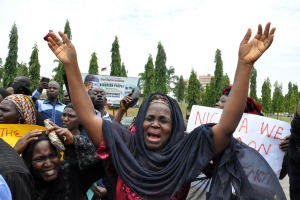Hundreds of Nigerian women who were kidnapped and raped at the hands of the Islamic extremists group Boko Haram are often rejected and ostracized after they return to their communities, reveals a disturbing new study released this week.
As many as 2,000 women and children, both girls and boys, have been abducted by Boko Haram since 2012, according to the report from International Alert, a peace-building group, and UNICEF.
The report, titled "Bad Blood: Perceptions of children born of conflict-related sexual violence and women and girls associated with Boko Haram in northeast Nigeria," notes that while in captivity, many of the women were raped and forced to marry militants.
As military forces reclaimed land captured by the jihadist group, hundreds of women and girls have been released from captivity, said the study. However in refugee camps or in their home communities, they face overwhelming rejection and persecution.
"As they return, many face marginalization, discrimination and rejection by family and community members due to social and cultural norms related to sexual violence," the report says.
"There is also growing fear that some of these girls and women were radicalized in captivity. The children who have been born of sexual violence are at an even greater risk of rejection, abandonment and violence."
The report notes that some of the women who have been released are pregnant or have given birth to children whose fathers are Boko Haram fighters. Community members told researchers that the there is widespread fear the children have "bad blood" transmitted from their fathers -- a concern echoed by some of the pregnant women themselves.
According to the report, one pregnant woman said, "When I think of the baby that will come, it disturbs me a lot because I always ask myself this question: Will the child also behave like JAS?" JAS is another name for Boko Haram.
"Many perceive these victims of conflict as being partly responsible for the violence and losses suffered by entire communities during the insurgency," report authors wrote. "As a result, children and newborns as well as their mothers are being increasingly ostracized and are at risk of further violence."
A report from the New York Times notes that such fears aren't entirely unfounded, as aid workers believe that some female captives have been trained to fight or encouraged to become suicide bombers. In addition, some combat experts believe that the female suicide bombers are brainwashed, while still others believe that they are unaware and that the devices are remotely detonated.
Boko Haram's official name is Jama'atu Ahlis Sunna Lidda'awati wal-Jihad, which in Arabic means "People Committed to the Propagation of the Prophet's Teachings and Jihad".
While Nigerian President Muhammadu Buhari declared the "technical defeat" of Boko Haram at the end of 2015, the group continues to carry out sporadic attacks of villages and markets across Nigeria.
A report released in November by the Global Terrorism Database (GTD) rated Boko Haram as world's deadliest terrorist organization, overtaking the Islamic State. According to the report, the Nigerian terror group killed 6,644 people in 2014 in comparison to ISIS's 6,073.

















